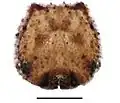| Calisto herophile | |
|---|---|
.JPG.webp) | |
| In Cuba | |
| Scientific classification | |
| Domain: | Eukaryota |
| Kingdom: | Animalia |
| Phylum: | Arthropoda |
| Class: | Insecta |
| Order: | Lepidoptera |
| Family: | Nymphalidae |
| Genus: | Calisto |
| Species: | C. herophile |
| Binomial name | |
| Calisto herophile Hübner, 1823 | |
| Synonyms | |
| |
Calisto herophile is a butterfly of the family Nymphalidae. It is endemic to Cuba[1] and the Bahamas. The species inhabits many habitats in Cuba, from suburban areas near major cities to the edges of evergreen and rainforests up to 1,100 meters of altitude, always disturbed in some degree.
The length of the forewings is 14–19 mm for males and 17–21 mm for females.[2] Adults are found year-round throughout Cuba.
The larvae feed on various grasses.[3] They eat the entire shell after hatching and feed at night, remaining in the lower parts of grasses during the day.
Subspecies
- Calisto herophile herophile (Cuba)
- Calisto herophile apollinis Bates, 1934
- Calisto herophile parsonsi Clench, 1943 (Cuba)
Gallery
 Male, upperside
Male, upperside Male, underside
Male, underside Female, upperside
Female, upperside
 First instar larva
First instar larva Fourth instar larva
Fourth instar larva Fifth instar, pale morph
Fifth instar, pale morph Fifth instar, dark morph
Fifth instar, dark morph Fifth instar, head capsule
Fifth instar, head capsule Pupa, lateral view
Pupa, lateral view Pupa, ventral view
Pupa, ventral view Pupa, dorsal view
Pupa, dorsal view Predation by a crab spider of the family Thomisidae
Predation by a crab spider of the family Thomisidae Predation by Stagmomantis domingensis
Predation by Stagmomantis domingensis
References
Wikimedia Commons has media related to Calisto herophile.
Wikispecies has information related to Calisto herophile.
- ↑ "Calisto Hübner, 1823" at Markku Savela's Lepidoptera and Some Other Life Forms
- ↑ Aguila, Rayner Núñez; Edelquis Oliva Plasencia; Pavel F. Matos Maravi; Niklas Wahlberg (2012). "Cuban Calisto (Lepidoptera, Nymphalidae, Satyrinae), a review based on morphological and DNA data". ZooKeys (165): 57–105. doi:10.3897/zookeys.165.2206. PMC 3272634. PMID 22328857.
- ↑ Sourakov, Andrei; Evgeny V. Zakharov (2011). ""Darwin's butterflies"? DNA barcoding and the radiation of the endemic Caribbean butterfly genus Calisto (Lepidoptera, Nymphalidae, Satyrinae)". Comparative Cytogenetics. 5 (3): 191–210. doi:10.3897/compcytogen.v5i3.1730. PMC 3833777. PMID 24260629.
This article is issued from Wikipedia. The text is licensed under Creative Commons - Attribution - Sharealike. Additional terms may apply for the media files.